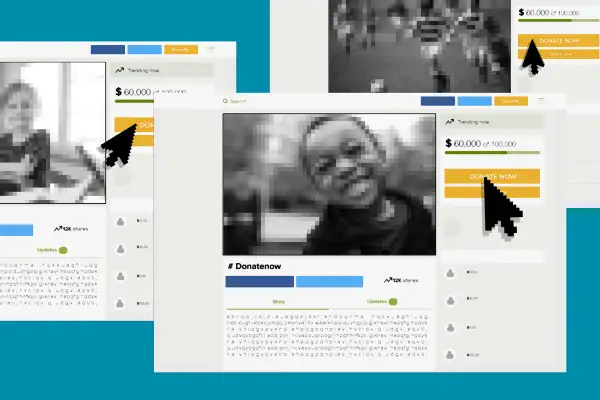GoFundMe Helps Struggling Americans Raise Cash. It Also Has a Huge Fraud Problem

In 2017, Katelyn McClure ran out of gas on a dark freeway off-ramp in Philadelphia.
Stranded and alone, she was eventually saved by a man named Johnny Bobbitt Jr., a homeless veteran who filled up her tank with his last $20. As soon as McClure got back home to New Jersey, her then-boyfriend, Mark D’Amico, started a GoFundMe to reward Bobbitt for his kindness.
Or so the three claimed. Though the heartwarming story captured the nation’s attention — landing the trio on Good Morning America and more than $400,000 in their crowdfunding campaign — it was completely bogus.
Earlier this month, a federal indictment hit D'Amico with a slew of charges, including wire fraud, conspiracy to commit wire fraud, and money laundering. In 2020, McClure and Bobbitt pleaded guilty to conspiracy to commit wire fraud and conspiracy to commit money laundering, respectively, and are currently awaiting sentencing.
This is one of the most high-profile examples of the many fundraising scams that have infected crowdfunding platforms and social media sites like Facebook. But it’s far from the only one.
COVID-19 has put a record number of Americans in precarious financial situations. As a result, there’s been an increase in online fundraisers from those who want to help people under financial strain. Unfortunately, cybersecurity and fraud expert Joseph Steinberg says, there has also been an increase in the number of scam artists looking to exploit people's charitable nature. And he doesn't expect it to stop anytime soon.
"It's unfortunate that people take advantage of people trying to do the right thing, but that's how criminals work," Steinberg says. "If there's money there, criminals are going to try to exploit that environment."
If you're feeling generous but concerned that your money won’t go to those who need it, here are Steinberg's tips for weeding out scammers.
Verify, Verify, Verify
The first step, Steinberg says, is "to look at who's running the campaign and if they've posted photos and videos. If you have a campaign that's all text ... be very wary."
If the fundraiser is for a charity, look at the organization's official website and social media channels for verification that the link you've been directed to is the real deal. If it’s for an individual, or on behalf of one, look for social media pictures that are recent and real (not obvious stock images) so you can be reasonably certain you're dealing with a real person. Steinberg suggests grabbing any photos you see and running them through a reverse Google Image search to make sure they aren't stolen from someone else's profile.
A social media presence can be faked, but the older a profile is, the better. "If you go back and look and [their] social media profiles were all created in the last week, those are red flags that should be waving in front of your eyes," Steinberg says.
Study the language
Charity scams tend to be fly-by-night operations where criminals try to get as much money as quickly as possible. Then they'll close up shop and slip away before the authorities catch on.
So while some fundraisers are legitimately trying to raise money as fast as possible for imminent medical procedures or similar pressing causes, Steinberg says that pressure to give money right away is often a giveaway. A classic example of the form, he says, is a message along the lines of "If we don't get the money by 14 hours, this person is going to die. I need you to donate right now."
Vagueness is another red flag. If you feel like there's something missing from the GoFundMe post, or you've read it a few times and aren't quite where the money is going and why it’s needed, that's usually a sign that a fraud artist is trying to minimize their exposure by withholding key information.
"Someone who's raising money for a real charity has no incentive not to give information," Steinberg says. "People that are trying to scam you try to avoid giving too much information because they don't want things that you could check."
Sometimes, the best recourse against getting scammed is using common sense. While the "homeless veteran saves a damsel in distress" story is the sort of heartwarming tale that people love to hear (and share) it also sounds like it was ripped straight from a soap opera. If your instinct is that something is off, you’re probably right.
Report fake fundraisers ASAP
GoFundMe says it reviews all of its campaigns, and allows people to request refunds if they feel they've been taken advantage of (Facebook has a similar vetting and refund process). But you should also do your part to get bad actors removed from these platforms.
"There is no way you could have a site that's going to be perfect and catch everything," Steinberg says. Resources like the Better Business Bureau and Charity Navigator are helpful to root out scams, but GoFundMe drives often fall below their radar. So if you do see a social media scam, Steinberg urges, report it right away.
"You have a responsibility if you think something's off to either report it or to look into it because it's not just about you," he says. "It's about the fact that you enrich the scammers, so they are going to keep pulling scams. And that's money that goes away from real charities and goes to people who are committing a crime."
More from MONEY:
Should You Pay Someone to "Fix" Your Credit Score?